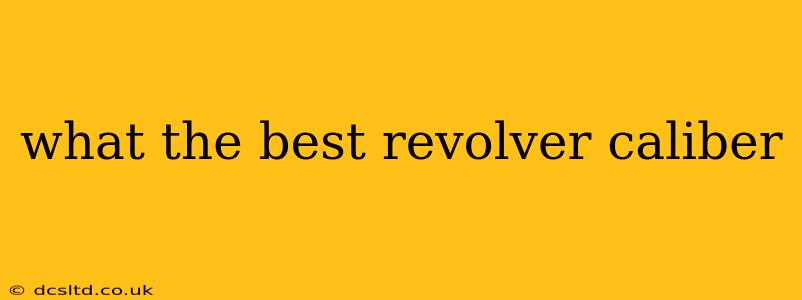What's the Best Revolver Caliber? A Deep Dive into Cartridge Choices
Choosing the "best" revolver caliber is a deeply subjective question, heavily dependent on intended use. There's no single right answer, as the ideal cartridge varies greatly depending on factors like self-defense, hunting, target shooting, or collecting. However, we can explore some of the most popular and effective calibers, considering their strengths and weaknesses. This will help you make an informed decision based on your specific needs and preferences.
What are the most popular revolver calibers?
Several calibers dominate the revolver market, each with its own following and advantages. These include .38 Special, .357 Magnum, .44 Special, .44 Magnum, .45 Colt, and .45 Long Colt. We'll delve deeper into these popular choices.
What is the best caliber for self-defense with a revolver?
For self-defense, the debate often centers around the .38 Special and the .357 Magnum. The .38 Special offers manageable recoil, making it suitable for smaller-framed individuals or those new to revolvers. Its ammunition is readily available and relatively inexpensive. However, the .357 Magnum boasts significantly more stopping power, thanks to its higher velocity and heavier bullet weights. The trade-off is increased recoil, potentially affecting accuracy, especially for less experienced shooters. Ultimately, the best choice depends on your physical capabilities and comfort level.
What is the best revolver caliber for hunting?
Hunting demands more stopping power than self-defense. Larger calibers like .44 Magnum and .45 Colt are often preferred for hunting larger game. The .44 Magnum, known for its impressive stopping power, is suitable for deer-sized game, while the .45 Colt, with its heavy bullets, is also effective, though potentially requiring more precise shot placement. The choice depends on the game you're hunting and your personal shooting preference.
What is the best revolver caliber for target shooting?
Target shooting often favors calibers that offer manageable recoil and consistent accuracy. The .38 Special is a popular choice due to its manageable recoil and relatively inexpensive ammunition, making it ideal for extended practice sessions. The .22 LR, while technically not a "magnum" caliber, is also extremely popular in revolvers for target practice because of its low recoil and affordability.
What are the differences between .38 Special and .357 Magnum?
The .38 Special and .357 Magnum are closely related cartridges. The .38 Special is a shorter, lower-pressure cartridge that can be fired safely in a .357 Magnum revolver. However, the .357 Magnum produces significantly higher velocity and energy, resulting in greater stopping power and a more pronounced recoil. Choosing between the two depends on your priorities: manageable recoil vs. maximum stopping power.
What about .44 Magnum vs .44 Special?
Similar to the .38 Special/.357 Magnum relationship, the .44 Special is a lower-pressure cartridge that can be fired in a .44 Magnum revolver. The .44 Magnum is renowned for its powerful stopping power, making it suitable for hunting larger game. However, its significant recoil can be challenging for some shooters. The .44 Special offers a milder recoil while still providing substantial stopping power for closer-range situations.
What is the best revolver caliber for beginners?
Beginners often find the .38 Special to be the most manageable due to its lower recoil. Its readily available ammunition and lower cost also contribute to its beginner-friendliness. Starting with a lighter-recoiling caliber allows you to focus on developing proper shooting technique without the added challenge of excessive recoil.
Ultimately, the "best" revolver caliber is subjective and depends heavily on your specific needs and priorities. Consider your intended use, your physical capabilities, and your comfort level before making your decision. Visiting a reputable firearms dealer and handling different revolvers in various calibers is highly recommended before making a purchase. Remember to always practice safe firearm handling and follow all applicable laws and regulations.
